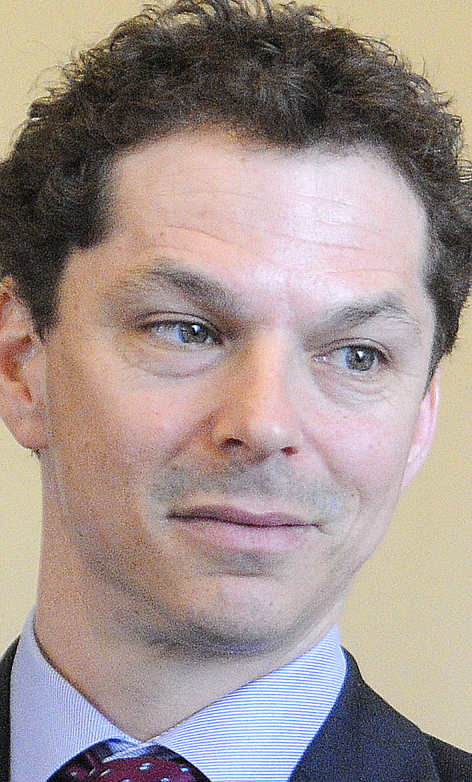It’s way, way too soon to call this a friendship. Maybe more of a January thaw.
But let the record show that in the run-up to Tuesday’s stunning approval of a $3.7 million bill to combat Maine’s exploding drug epidemic, Gov. Paul LePage and Senate Minority Leader Justin Alfond, D-Portland, did something they haven’t done in … well, ever.
They worked closely together.
They found themselves agreeing more than they disagreed.
And with speed not seen under the State House dome for a long, long time, they managed to get something important done with no finger-pointing, no rhetorical bomb throwing, no fuss whatsoever.
“As someone in the Senate said, it was a good day for the Maine Legislature. And it was a good day for Maine’s chief executive,” Alfond said in an interview Wednesday, one day after both chambers unanimously approved the drug bill and LePage quickly signed it into law.
It all began with a textbook case of anger management.
Last month, LePage traveled to Portland to hold a town hall meeting at the University of Southern Maine. Near the end of the increasingly contentious session, his press secretary, Adrienne Bennett, asked all past and current legislators in the audience to stand.
There, far up in the cheap seats, rose Alfond, long one of LePage’s favorite foils when it comes to assigning the blame for all that is wrong with Maine.
“This gentlemen right there,” LePage said, jabbing his finger toward Alfond. “He’s in the second class … he’s in the second class of legislators. He’s willing to sell himself to other people so he can get his way done. That’s not the way Mainers want things to work!”
With that, amid a smattering of boos and catcalls, the forum abruptly ended and LePage departed.
“I was pissed off,” said Alfond, who in the past had been branded a “little spoiled brat” and similar names by LePage – all pointing to the fact that Alfond comes from one of Maine’s wealthiest (and, lest anyone forget, philanthropic) families.
But this time, rather than respond through the media or ignore LePage altogether, Alfond requested a meeting with the governor. No staff, no position papers, no political bases to stoke, just two guys who happen to look at the world very differently meeting face-to-face alone.
LePage, to his credit, said come on down.
“I said, ‘What are you doing?'” Alfond said. “I said, ‘If you want to have a public conversation, let’s have a public conversation. But don’t single me out like that.’ ”
And?
“He agreed that that wasn’t fair.”
Eureka.
So what does one do in such a moment? Faint dead on the spot? Shake hands and head back to the trenches?
“We started talking,” Alfond said. “And it was about the drug crisis.”
LePage, he said, showed him some of what he’d been reading about the challenges surrounding various forms of treatment for opiate and heroin addiction. From there, the conversation progressed into what the executive and legislative branches, working together, might be able to accomplish around the high-priority issue before Maine’s 127th Legislature wraps up its final session later this spring.
“So finally I said, ‘Listen, if I call can I come back in?'” Alfond said. “And he said, ‘Sure. Let’s keep talking.'”
Underlying this sudden détente, of course, was the mutual realization that neither LePage nor the Legislature was likely to achieve significant progress on the drug front by going it alone.
What’s more, sharp disagreements still lingered over how to fund much of the $3.7 million proposal and how to distribute portions of it. The closer they got to a final vote, the more Alfond and other legislative leaders feared that this bill – the first but by no means the last aimed at the life-and-death challenge of drug addiction – might never get off the ground.
Still, as this week approached, everyone kept talking.
The $2.5 million earmarked for treatment – Democrats wanted the money to come from the state’s $21.5 million share of a settlement with Standard and Poor’s dating back to the 2008 financial crisis; Republicans wanted to tap into the Fund for A Healthy Maine – ultimately came (after another chat between Alfond and LePage) from the Medical Use of Marijuana Fund.
Disbursement of anti-drug grants to local police and county jails – LePage bristled at letting the Attorney General’s Office hold the purse strings – was assigned to the Maine Department of Public Safety after Alfond received the governor’s assurance that the funds would in fact go out.
“One percent of one percent of people out there care about this stuff,” Alfond noted. “To everyone else, it’s just minutia. They just want things to get done, get accomplished.”
Which brings us back to Tuesday, a day many expected would end in yet another partisan train wreck.
First, both chambers of the Legislature passed the drug bill. Unanimously.
Then, only hours later, LePage signed it. Quietly.
“I was surprised,” Alfond admitted.
Did he take LePage’s quick signature – the governor could have kept everyone guessing for 10 days – as a sign of goodwill?
“I did,” Alfond replied. “We’d just worked together on something. Everyone put their best foot forward. We all gave and got, and we got a better bill out of it.”
Where this goes from here is anyone’s guess.
In an email Thursday, Peter Steele, LePage’s communications director, noted that this was the first time Alfond had ever requested a personal meeting in the governor’s office, “so the governor agreed.”
“The governor is always willing to meet with anyone who is interested in discussing good policy that benefits the Maine people and moves our state forward,” Steele wrote. “He is not interested in meeting with politicians seeking favors or playing games.”
Meaning, we can only assume, Alfond and LePage won’t be hitting the golf course anytime soon.
But they’re talking.
And any way you look at it, that’s a good thing.
Send questions/comments to the editors.



